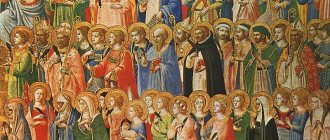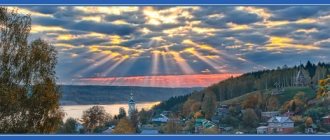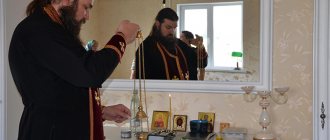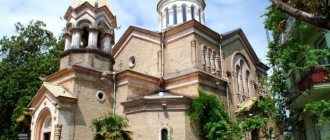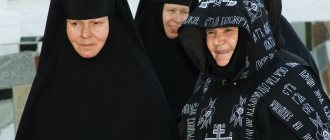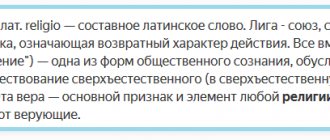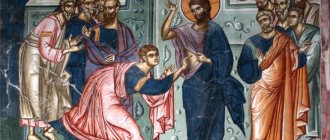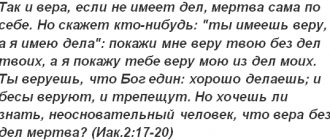Venerable Sergius of Radonezh
years of life: 1314–1392 days of memory: July 18, October 8
A native of Rostov the Great, Saint Sergius in his youth moved with his parents near Moscow, to Radonezh, and his entire life’s journey was connected with Moscow, which gained political weight in the 14th century and became the real center of Rus' after the Mongol devastation.
The main feat of St. Sergius is associated with the revival of Russian monasticism, the heart of which was the monastery he created in the Radonezh forests in honor of the Most Holy Trinity (now the Holy Trinity Lavra of St. Sergius). There is evidence that Sergius maintained contacts with Greek hesychast monks (from the Greek ἡσυχία - silence, silence), who mastered the art of deep solitary prayer, which led them to the contemplation of the Divine mysteries...
But at the same time, St. Sergius was an all-Russian conciliator, a man of unquestioned spiritual authority. The Grand Duke of Moscow Dmitry Ivanovich (known as Donskoy) came to him in 1380 for a blessing for the battle with Khan Mamai. Moscow Metropolitan Alexy approached him with a request to help end civil strife in the Nizhny Novgorod principality, where the impostor had seized power (Sergius came to the city on foot and locked all the churches there until the legitimate prince returned). After the death of Saint Alexy, he was offered—though unsuccessfully—the chair of the first Russian hierarch, Metropolitan of Moscow and All Rus'.
The Monk Sergius did not visit Moscow itself very often. But the memory of the saint is preserved by the monasteries founded by his disciples: the Andronikov Monastery in Moscow, the Savvino-Storozhevsky Monastery in Zvenigorod, the Vysotsky Monastery in Serpukhov, the Pafnutyev-Borovsky Monastery near Kaluga... And first of all, of course, the Holy Trinity Lavra of St. Sergius itself.
Holy Blessed Prince Dmitry Donskoy
years of life: 1350–1389 memorial day: June 1
The Grand Duke of Moscow Dmitry Ivanovich Donskoy, a pupil of Metropolitan Alexy of Moscow, is known primarily as the conqueror of Khan Mamai, who defeated his army on the Kulikovo field on September 8, 1380. This was the first victory of Russian weapons over the Horde, and a victory of gigantic proportions: Mamai brought to Rus' more than 400,000 soldiers from a variety of nations, including even Lithuanians and Italians!
Prince Dmitry managed to unite most of the principalities around Moscow, which had previously not lived very amicably, secured the blessing for the battle of the highly revered St. Sergius of Radonezh, and on the eve of the decisive battle he declared a strict fast throughout his army and prayed to God for a long time. In many ways, this was a victory of the Russian Orthodox spirit, and not just of military force.
The affairs of the Church were always among the most important for the prince. Sometimes he made mistakes, supporting the unworthy (for example, he persistently promoted the power-hungry priest Mikhail Mityai to Moscow metropolitan office). But the Russian Church owes the prince two holidays at once - the day of the discovery of the relics of his great-grandfather Alexander Nevsky (September 12) and Demetrius's parental Saturday (the Saturday before the day of remembrance of the Great Martyr Demetrius of Thessaloniki). The latter was installed in memory of those who fell on the Kulikovo Field.
The reign of Dmitry Donskoy is a rare example of respect and love for his subjects: almost none of them left him during all the years of his reign, and the prince’s spiritual will bears more boyar signatures than any other surviving princely will. His marital union with Princess Evdokia (in monasticism - Euphrosyne of Moscow) is one of the best examples of a Christian marriage based on complete trust in each other.
Moscow also owes its first stone Kremlin to Prince Dmitry Donskoy: it was during his reign that the city’s fortress walls, previously wooden, were rebuilt in white brick. The white-stone Kremlin helped Muscovites successfully defend against the Lithuanians in 1368 and 1370 and survived until the time of Ivan III, who at the end of the 15th century erected the red-brick Kremlin that has survived to this day.
Prince Daniel. City Builder
In the year of the death of Grand Duke Alexander Nevsky, the youngest of his sons, Daniil, was two years old. He inherited the smallest inheritance: the unknown town of Moscow, which stood at the intersection of trade routes between major principalities. Holy book Daniil Alexandrovich. Miniature from the Tsar's tutular. 1672-1673 Alas, for the most part, the children of Alexander Nevsky did not inherit their father’s wisdom: for many years they plunged headlong into internecine wars. And only the younger and peace-loving Daniel diligently avoided conflicts, earning the reputation of a humble peacemaker. Once forced to go on a campaign with one of his brothers, he made great efforts and was able to finish the matter peacefully before the start of the first battle. He himself fought only once, and very successfully: the conflict with the Ryazan principality ended with the then large city of Kolomna falling to Moscow. Prince Daniel spent most of his energy on strengthening his small inheritance, engaged in trade, construction, and the peaceful expansion of his possessions. The peacemaker prince might seem weak and cowardly against the backdrop of his warlike brothers, but history had its own way: by the end of his reign, Moscow became the center of one of the largest principalities. Now everyone took her into account. And already Daniel’s son, Yuri, added to the title “Prince of Moscow” the title of “Grand Duke”, declaring the city’s claims to capital status.
For Christ's sake, holy fool Vasily of Moscow (Blessed)
years of life: 1462 (or 1468) - 1557 memorial day: August 15
Vasily accepted the feat of foolishness - unusual, eccentric behavior from the point of view of most people - already in his adolescence. Not only in summer, but even in winter, he walked around barely dressed, ate and drank whatever he had to, and on principle refused to spend the night under a roof, even with good friends. In Moscow, he was already revered during his lifetime as a seer: for example, in 1521, Vasily predicted an imminent invasion of Moscow by the Crimean Khan Mehmet Giray, and in 1547 - a huge fire that engulfed the city and frightened the then young Ivan the Terrible.
The most famous episodes of the saint’s life are also associated with the name of Ivan the Terrible. According to one of the legends, having once received a certain drink from the tsar as a treat, Vasily threw both offered bowls out the window and explained to the tsar: he was putting out the fire in Veliky Novgorod. Subsequently, eyewitnesses said: Novgorodians saw some naked man putting out a fire that had started. Another time, while in the church during the liturgy, the holy fool hid in a corner so that the king could not see him. When he later asked Vasily why he was not at the service, the saint replied: he was there, but the tsar was not - while standing at the service, the autocrat was completely immersed in dreams of a new palace on the Sparrow Hills.
The relics of St. Basil the Blessed rest in the Intercession Cathedral on the Moat on Red Square (that’s what people call it - St. Basil’s Cathedral). For all time, he remains the image of a righteous man who had the courage to point out to the king himself his shortcomings. Subsequently, his example inspired other holy fools to do the same - Nikolai Salos, John the Big Cap: they already directly convicted Ivan the Terrible of his crimes.
Temple of the Tikhvin Icon of the Mother of God in Alekseevsky - Tikhvin Church in Alekseevsky
Troparion of the Moscow Saints, Tone 4 Mother Sees of Russia,/ true custodians of apostolic traditions,/ pillars of steadfastness, teachers of Orthodoxy,/ Peter, Alexis, Jono, Philippa and Hermogene,/ Pray to the Lord of all/ to grant greater peace to the universe// and great mercy to our souls./ span>
Kontakion of the Moscow Saints, tone 3 Live piously among the saints/ and teach people to the understanding of God,/ and please God well,/ for this reason from Him through incorruption/ and you are glorified by miracles,// as disciples of God’s grace.
Dear brothers and sisters!
On October 5 (18), the Russian Orthodox Church celebrates the memory of the great saints Peter, Alexei, Jonah, Macarius, Philip, Job, Hermogenes, Tikhon, Peter, Philaret, Innocent and Macarius, wonderworkers of Moscow and all Russia. Despite the difference in historical eras in which the saints lived, their different character and appearance, the Moscow miracle workers are united by deep love for Christ, selfless service to the Church, the Russian state and their neighbors. It is no coincidence that we celebrate their memory on the same day, despite the fact that the Church has also established special solemn dates for each of the saints.
Cathedral of Moscow Saints
Celebrating the memory of the saints on one day, we give each of them equal honor, as the heavenly patrons of the city of Moscow and prayer books for the Russian state. One of the most ancient examples of conciliar veneration is the memory of the holy 12 apostles. Following this example, the Russian Orthodox Church honors together the twelve saints of Moscow and all Russia, miracle workers - intercessors, representatives and guardians of the Church and the Fatherland. The Moscow saints set an example of true Christianity through their lives, showing tireless concern for church and state order. The power that they possessed by the nature of their ministry served them not as a condemnation, but as a glorification: they cared not about their own interests, but about the eternal salvation of the flock entrusted to them.
The burden of enormous responsibility for the fate of the Motherland not only did not break them, but, on the contrary, mobilized them to fight for the truth of Christ. Among the saints were martyrs and confessors of the faith who suffered both at the hands of foreign invaders (Saint Hermogenes), and who died from the evil oprichnina (Metropolitan Philip) and Soviet power (Hieromartyr Peter, Metropolitan of Krutitsky). There were also those who, although they departed to the Lord in old age, nevertheless turned their entire lives into one service. Thus, Saint Macarius made an invaluable contribution to the development of Old Russian writing.
The Menaions he compiled collected and edited various lists of the lives of many saints, the homiletical, theological and patriotic heritage of our Church. Let us recall that the celebration on one day in honor of the All-Russian saints was established by Patriarch Job on October 5, 1596 in honor of Metropolitans Peter, Alexy and Jonah. “Just as the three great pillars of Orthodoxy: Basil the Great, Gregory the Theologian and John Chrysostom preserved the building of the ancient Eastern Church unshaken during the persecution that befell it from the heretics, so the three great hierarchs of the Moscow Church: Peter, Alexy and Jonah preserved Orthodoxy intact in the Holy Land Russian in difficult times of her internal unrest and troubles from numerous external enemies.” Then, already in 1875, Metropolitan Philip was added to the Council of Saints, and in 1913, Patriarch Ermogen. The names of the holy Primates of the Russian Orthodox Church, Patriarchs Job and Tikhon and Metropolitans Macarius, Philaret, Innocent, Macarius and Peter are included in the Council of Moscow Hierarchs according to the definition of the Holy Synod of the Russian Orthodox Church of December 27, 2005. Thus, 12 saints of Moscow and all Russia, miracle workers, like the 12 great apostles, they complemented the host of saints of the Heavenly and earthly Church. The saints carried out apostolic service among the Russian people, their voice sounded in all parts of the Fatherland, calling for unity against external and internal enemies.
Saint Peter
Thus, Saint Peter experienced many difficulties during the years of governing the Russian Metropolis. There was no firm order in the land that suffered under the Tatar yoke. During this period, the saint’s labors and concerns for the establishment of true faith and morality in the state were especially important. During his constant tours of dioceses, he tirelessly taught the people and clergy about the strict preservation of Christian piety. He called on the warring princes to be peaceful and unity. In 1325, at the request of Grand Duke John Danilovich Kalita, the saint transferred the metropolitan see from Vladimir to Moscow. This event was important for the entire Russian land. The saint prophetically predicted liberation from the Tatar yoke and the future rise of Moscow as the center of all Russia.
Saint Alexy
Saint Alexei made many efforts to pacify the endless strife and unrest that tormented the Church and the Fatherland. The saint had to work hard to reconcile and humble the obstinate princes who did not want to recognize the power of Moscow. More than once the saint had to travel to the Golden Horde to defend Russian land. In 1357, the khan demanded from the Grand Duke that the saint come to him and heal the blind Taidula, his wife. At the same time, Janibek added: “If the queen receives healing through the prayers of that man, you will have peace with me. If you do not send him to me, then I will destroy your land with fire and sword.” “The petition and the deed exceed the measure of my strength,” said Saint Alexy, “but I believe in the One who gave the blind his sight—He will not despise the prayers of faith.” Through the prayer of the saint, the khan's wife was healed. This contributed to the softening of the Horde’s policy towards the Russian land and saved thousands of lives of our ancestors.
Saint Jonah
Saint Jonah is the first metropolitan elevated to the see by Russian bishops. For his work for the good of the Church of Christ, he was awarded from God the grace-filled gift of miracles and clairvoyance. In 1451, the Tatars unexpectedly approached Moscow, burned the surrounding area and prepared to attack the city. Metropolitan Jonah and the clergy made a religious procession along the walls of the city, with tears praying to God for the salvation of the city and people. Seeing the elderly monk Anthony, a monk of the Chudov Monastery, who was distinguished by a virtuous life, Saint Jonah said: “My son and brother Anthony! Pray to the merciful God and the Most Pure Mother of God for the deliverance of the city and all Orthodox Christians.” The humble Anthony replied: “Great saint! We thank God and His Most Pure Mother: She heard your prayers and begged Her Son, the city and all Orthodox Christians will be saved through your prayers. The enemies will soon be defeated. Only I alone am destined by the Lord to be killed by enemies.” As soon as the elder said this, an enemy arrow pierced him. Elder Anthony’s prediction came true: on July 2, the feast of the placement of the Robe of the Most Holy Theotokos, confusion occurred in the ranks of the Tatars, and they fled in unknown fear and horror. Saint Jonah soon built a temple in his courtyard in honor of the position of the Robe of the Most Holy Theotokos in memory of the deliverance of Moscow from its enemies.
Saint Macarius
Saint Macarius, while still an archbishop, devoted a lot of energy and care to serving his neighbors, treating rich and poor, small and great equally. He himself buried those who burned in prison during the fire, and collected money throughout the diocese to ransom his compatriots from Tatar captivity. During the time of national disasters, pestilence and drought that happened in Veliky Novgorod, the archpastor convenes the clergy, delivers sermons, performs prayer services with a special rite of washing the holy relics and then orders to sprinkle everything in the vicinity with this water. Soon the pestilence and epidemic cease. With his arduous work, Archbishop Macarius gained great love from his flock. In 1552, Metropolitan Macarius blessed the tsar to go to Kazan and predicted his future victory and victory. Later, in memory of this event, the Cathedral of the Intercession on the Moat was built in Moscow, now known as the Church of St. Basil the Blessed. A chapel was built in it in honor of the Entry of the Lord into Jerusalem. Here, on Red Square, in memory of the Gospel event, the saint made a solemn procession on a donkey on the feast of Palm Resurrection.
Metropolitan Philip
Metropolitan Philip went to voluntary suffering on the cross in order to somehow influence Ivan the Terrible, who unleashed the terrible oprichnina, whom he repeatedly denounced for the death of innocent subjects: “since the sun shines in the sky, it has not been heard of pious kings outraged their own power... The Tatars and pagans have law and truth, but we don’t have them. We, sir, offer a bloodless sacrifice to God, and behind the altar the innocent blood of Christians is shed. I do not grieve for those who, by shedding their innocent blood, are honored with the share of holy martyrs; I suffer for your poor soul. Although you are honored in the image of God, you are nevertheless a mortal man, and the Lord will exact everything from your hand.” The king exclaimed: “Philip! Or do you dare to resist our power? Let’s see, we’ll see how great your fortress is.” “Good King,” answered the saint, “it is in vain that you frighten me. I am a stranger on earth, struggling for the truth, and no amount of suffering will silence me.” The saint, killed by Malyuta Skuratov, continues to this day to pray for the Fatherland and its rulers, so that the Lord would make them wise in the matter of governing the people entrusted to them.
Patriarch Job
Patriarch Job was the first Russian patriarch in the history of our Church. The saint celebrated the Divine Liturgy daily, reciting the Gospel, the Psalter and the Apostle by heart. “In his days there was not found a man like him, neither in image, nor in character, nor in voice, nor in rank, nor in behavior, nor in question, nor in answer,” notes a contemporary. Patriarch Job, being already old and sick, drew up accusatory letters in which False Dmitry was named by his real name as the fugitive monk Grigory Otrepyev, a deceiver and impostor. In January 1605, Patriarch Job anathematized False Dmitry and the traitors who supported him. After the sudden death of Tsar Boris Godunov, a riot broke out in Moscow, the city was surrendered to the impostor and the Poles. Patriarch Job refused to swear allegiance to False Dmitry and was deposed. The servants of False Dmitry broke into the Assumption Cathedral of the Kremlin to kill the patriarch. The saint prayed at this time before the Vladimir Icon of the Mother of God. Supporters of the impostor tore the bishop's vestments from the patriarch and did not allow him to finish the Liturgy. He suffered many reproaches and was exiled to the Staritsky Assumption Monastery, where he died.
Patriarch Hermogenes
Hieromartyr Hermogenes, Patriarch of Moscow and All Russia, began his ministry in Kazan, where terrible morals reigned. Already during his lifetime, the saint became famous as a shepherd, “who laid down his life for the sheep,” as “a strong stand against enemies... an accuser of traitors and destroyers of the Christian faith.” He steadfastly defended the Tatars who converted to Orthodoxy from inevitable death at the hands of brutal relatives. The patriarchate of the saint coincided with the difficult times of the Time of Troubles. He steadfastly resisted the traitors and enemies of the Fatherland who wanted to enslave the Russian people, introduce Uniateism and Catholicism in Russia, and eradicate Orthodoxy. When False Dmitry II approached Moscow in June 1608, Patriarch Hermogenes addressed the rebels and traitors with two messages in which he denounced them and exhorted them: “Remember against whom you are raising arms: is it not God who created you? Is it not your brothers? Are you ruining your Fatherland? I conjure you in the name of God, leave your undertaking while there is time, so as not to perish to the end... For God’s sake, know yourself and convert, make your parents, your wives and children, and all of us happy; and we will pray to God for you...” Unfortunately, the Patriarch's appeal was not heard by the traitors. They imprisoned him in the Chudov Monastery, from where the saint called on the Russian people to liberate the Fatherland. Muscovites, under the leadership of Kozma Minin and Prince Dmitry Pozharsky, raised an uprising, in response to which the Poles set fire to the city and took refuge in the Kremlin. However, the Patriarch did not live to see the liberation of Moscow from the Poles - he died a martyr from hunger and thirst in February 1612.
Saint Philaret
Saint Philaret was known as a talented preacher. Metropolitan Platon (Levshin) recognized the superiority of his favorite’s homiletical gift over his own. “I write in a human way,” said the archpastor, “and he writes in an angelic way.” At almost every service the saint delivered a sermon. Already in his old age, he pronounced them in a quiet, weak voice, almost never improvised, did not speak by heart, but read from paper. The abbot of the Lavra, Archimandrite Anthony (Medvedev), once asked the saint: “Why don’t you talk to the people in the church without preparation? And in your ordinary conversation, write every word you say in a book...” “I lack courage,” the great preacher, who was given a rare gift of speech from God, answered with humility. From 1810 to 1817 The saint developed an almost complete course of theological and church-historical sciences, which were taught at the Theological Academy. He was the first at the St. Petersburg Academy to give lectures in Russian. One of the saint’s important works was organizing the work of translating the Gospel into Russian. The saint himself selected the translators. He took upon himself the translation of the Holy Gospel of John. He also compiled the “Rules” for translation. In 1819, the translation of the Four Gospels was completed and published. The great archpastor, the pillar of the Russian Church, Metropolitan Philaret was also one of the pillars of the Russian state. Emperors and grand dukes, ministers and senators, governors and generals listened to his experience and wisdom.
Saint Innocent
Saint Innocent devoted all his strength to the cause of enlightening the peoples of Kamchatka, the Aleutian Islands, North America, Yakutia, and the Khabarovsk Territory, performing his apostolic feat in harsh conditions, with great danger to life. He baptized tens of thousands of people, built churches, where he founded schools and taught them the basics of Christian life. During numerous trips, Saint Innocent studied the language, life and customs of the peoples among whom he preached. His works on geography, ethnography and linguistics gained worldwide fame. He compiled the alphabet and grammar of the Aleut-Lisev language and translated the Catechism, the Gospel and many prayers into it. Thanks to the works of Saint Innocent, in 1859 the Yakuts heard the Word of God and worship in their native language for the first time. Under the care of Metropolitan Innocent, the Missionary Society was created, the Moscow Intercession Monastery was transformed into a missionary one, and in 1870 the Japanese Orthodox Spiritual Mission was established, headed by Archimandrite Nikolai Kasatkin (later St. Nicholas of Japan), to whom Saint Innocent passed on much of his spiritual experience.
Saint Macarius
Saint Macarius, Metropolitan of Moscow and Kolomna, Apostle of Altai, went to the Altai mission as an ordinary employee. At first, the future saint served as a reader, taught at a catechist school, accompanied missionaries to remote, inaccessible wild places, and studied the Altai language. Having perfectly mastered the Altai language and its dialects, he devotes his energies to translating liturgical books into the Altai language, working on this in St. Petersburg and Kazan. In 1912, the saint was appointed Metropolitan of Moscow and Kolomna and a member of the Holy Synod. In Moscow, Vladyka pays great attention to the catechesis of the Russian people, boldly denounces the moral debauchery of his contemporaries, and opposes everything that undermines the “stronghold of the Church of God.” After the February coup, the ruler remained loyal to the Emperor and refused to swear allegiance to the Provisional Government. The saint is forced “as out of step with the spirit of the times” - under the threat of imprisonment in the Peter and Paul Fortress - to submit his resignation. Already in his old age, weak in health but strong in spirit, the holy elder departed to the Lord.
Patriarch Tikhon
Patriarch Tikhon at one time provided pastoral care not only to the Russian, but also to the American flock, where to this day he is called the Apostle of Orthodoxy. For seven years, traveling thousands of miles, he visited hard-to-reach and remote parishes in America, helped organize spiritual life, and built new churches, including the majestic St. Nicholas Cathedral in New York. In the terrible years after the October Revolution, the saint cried out: “Lord, the sons of Russia forsook Thy Testament, destroyed Thy altars, shot at temple and Kremlin shrines, beat Thy priests...” He calls on the Russian people to cleanse their hearts with repentance and prayer, to resurrect “in the time of the Great Visitation of God in the current feat of the Orthodox Russian people, the bright, unforgettable deeds of their pious ancestors.” The last words of Patriarch Tikhon before his death were: “My children! All Orthodox Russian people! All Christians! Only on the stone of healing evil with good will the indestructible glory and greatness of our Holy Orthodox Church be built, and her Holy Name and the purity of the deeds of her children and servants will be elusive even to enemies. Follow Christ! Don't change Him. Do not give in to temptation, do not destroy your soul in the blood of vengeance. Don't be overcome by evil. Conquer evil with good!” Persecuted and persecuted by the godless authorities, the saint, with prayer on his lips, gave up his soul to the Lord on the Feast of the Annunciation of the Most Holy Theotokos.
Hieromartyr Peter
Hieromartyr Peter , being a high-ranking synodal official, traveled with audits to almost all of Russia, examining the state of theological schools. During the beginning of the persecution of the Holy Church, in 1920, His Holiness Patriarch Tikhon invited him to take monastic vows, the priesthood and become his assistant in matters of church administration. Telling his brother about this offer, he said: “I cannot refuse. If I refuse, I will be a traitor to the Church, but when I agree, I know I will be signing my own death warrant.” In the last months of Patriarch Tikhon’s life, Metropolitan Peter was his faithful assistant in all matters of governing the Church. After the death of the Patriarch, the duties of Patriarchal Locum Tenens were entrusted to Metropolitan Peter, since Metropolitans Kirill and Agathangel were in exile. In November 1925, Metropolitan Peter was arrested - a time of numerous exiles, moral and physical torture began for him. He was repeatedly offered to renounce his high priesthood in exchange for freedom, but he refused. At that time he wrote: “... as the Primate of the Church, I should not seek my own line. Otherwise, what would happen in the language of the Church is called deceit.” The saint's health was greatly undermined. But the will to resist could not be broken. Already an old man, he continued to be kept in dungeons, fearing the influence of the metropolitan on the Orthodox flock. In July 1937, by order of Stalin, an operational order was developed to execute all confessors in prisons and camps within four months. In accordance with this order, the administration of the Verkhneuralsk prison filed a charge against the Saint: “... shows himself to be an irreconcilable enemy of the Soviet state..., accusing its leaders of persecuting the Church. Slanderously accuses the authorities of N.K.V.D. of being biased towards him, which allegedly resulted in his imprisonment, since he did not accept the demand of N.K.V.D. to renounce the rank of Locum Tenens.” In the fall of 1937, Hieromartyr Peter was shot.
The saints of Moscow and all Russia, miracle workers, gave their lives for Christ and his Church. Their prayers for the well-being of the Russian state and the salvation of its people continue to unceasingly rise before the Throne of the Most High.
Saints and miracle workers of Moscow Peter, Alexie, Iono, Macarius, Philip, Job, Hermogen, Philaret, Innocent, Tikhon, Macarius and Peter, pray to God for us.
Troshchinsky Pavel
Hieromartyr Hermogenes, Patriarch of Moscow and All Rus'
years of life: about 1513 - 1612 memorial day: March 2, May 25, October 17 - Cathedral of Kazan Saints, October 18 - Cathedral of Moscow Saints
The second Russian Patriarch after St. Job, elected to this post in one of the most difficult historical eras for Russia - the Time of Troubles. Perhaps the only person at that time who enjoyed universal respect, throughout his patriarchate (1606–1612) he clearly pursued one single line - to maintain Russia’s loyalty to Orthodoxy. When the boyars overthrew Tsar Vasily Shuisky, Saint Hermogen reluctantly agreed with the proposal to offer the throne to the Polish prince Vladislav, but with a strict condition - that he would convert from Catholicism to Orthodoxy. When the Poles occupied the Kremlin, the holy Patriarch fought with all his might against the invaders - both in word and in deed: even while in captivity, he sent letters to Russian cities, calling on the people to unite and return Moscow. These appeals and the position of the Patriarch played a crucial role in the liberation of the capital from the Poles by the second people's militia under the leadership of Kuzma Minin and Dmitry Pozharsky.
Ermogen himself did not live to see this moment: in February 1612, he, imprisoned by the Poles in the Chudov Monastery, died of hunger.
The Chudov Monastery was destroyed by the Bolsheviks in the early 1930s, but the relics of St. Hermogenes were transferred to the main cathedral of Russia in the middle of the 17th century - the Kremlin Assumption Cathedral. They still rest there today.
Bishop Afanasy. Martyr for the Faith
The fate of Bishop Afanasy (Sakharov) is in many ways typical of his generation.
Having died in 1962, he turned out to be closest to us in time from a whole generation of Moscow martyrs for the faith of the 20th century. Having accepted monasticism just five years before the revolution, he did not give up his faith, despite any challenges. Since the late 20s, his life has been a series of exiles, arrests and imprisonments. The saint visited Solovki, built the White Sea-Baltic Canal, was declared disabled in 1947, but was released only after Stalin’s death, in 1954. *** Of the 542 people included in the Cathedral of Moscow Saints, 461 lived in the twentieth century. The era of great persecution turned into a time of great glory for the Church. And therefore, the Moscow saints are not at all ancient times, they are much closer to all of us than we sometimes think.
Saint Philaret, Metropolitan of Moscow
years of life: 1782–1867 memorial day: December 2, October 18 – Cathedral of Moscow Saints
An entire era in the life of Russia is associated with the name of Metropolitan Philaret (Drozdov). The time in which he lived is today called the Synodal period: the Church was headed not by the Patriarch, but by a meeting of several bishops - the Holy Synod, over which stood the Chief Prosecutor - a government official with the rank of minister. In many matters the Church was dependent on the state, and some of the kings (for example, Paul I) even tried to declare themselves the head of the Church in the manner of Protestant rulers.
And it is largely the merit of Saint Philaret - a remarkably intelligent and educated man, a true man of prayer, a brilliant preacher, a profound theologian - that the Church then did not degenerate into a “department of the Orthodox confession,” but retained its originality and subordination to Christ. The Moscow Metropolitan was deeply respected and consulted with him on all serious issues (not only spiritual) by all the emperors who ruled at that time. Pushkin spoke enthusiastically about him. People of various ranks and classes came to him - from peasants and merchants to ministers and aristocracy. He was valued and respected for his intelligence, his tact, his thoroughness, and his integrity. Once, for example, the saint, who was very fond of consecrating churches, firmly refused Nicholas I’s request to serve a prayer service on the occasion of the installation of the Arc de Triomphe in Moscow in honor of the victory over Napoleon: after all, it contained overt pagan images.
And of course, the entire Russian people are indebted to St. Philaret for the translation of the Bible into modern (19th century) Russian. And also - his famous Catechism, according to which many still study the foundations of the Orthodox faith.
Metropolitan Philip. Aristocrat and human rights activist
But even during the years of rampant oprichnina terror, there were people in the country who were not afraid to speak out against it. Fyodor Kolychev came from an influential boyar family close to the Tsar. A brilliant career at court awaited him, but he chose a different path: he left everything and went north, taking monastic vows at the Solovetsky Monastery with the name Philip. Over time, he became the rector of the famous monastery, under him it reached its peak, and later, at the personal invitation of the Tsar, Philip was appointed Moscow Metropolitan. Metropolitan Philip (Theodore Kolychev) The Terrible Tsar really counted on the support of his long-time friend, whom he had known since his youth, but the new Metropolitan did not remain silent, seeing what was happening in the country. He publicly condemned the atrocities of the oprichnina, calling on the Tsar to abandon terror. The Metropolitan knew perfectly well what he was getting into, but considered it wrong for his rank to remain silent at such a difficult moment for the state. At the request of the tsar, he was removed from office, exiled to a distant monastery, and later killed there by the guardsman Malyuta Skuratov. Only during the reign of the Romanovs did the authorities officially admit their guilt to the metropolitan, and the Church canonized him.
Holy Righteous Alexy Mechev
years of life: – 1859-1923 memorial days: June 22, September 29
Most of the life of Alexy Mechev’s father occurred in the pre-revolutionary period - and still this life turned out to be very difficult. Already being a priest and even rector of the Church of St. Nicholas on Maroseyka, he and his family lived literally on the brink of poverty: then, at the beginning of the 20th century, the Moscow public did not visit churches very often, especially if there was no deacon with a booming bass or a choir that would transform the service to the "concert". For eight years, Father Alexy served the liturgy alone in an empty church; and still served daily, not considering it possible to neglect his main calling as a priest. In the end, this bore fruit: people flocked to the temple on Maroseyka. Already during the years of the revolution, one of the strongest church communities was formed here, which its members themselves began to call the word “family”, however, not a simple one, but a “penitential” one: after all, at its center stood a wonderful confessor - Father Alexy.
People were also drawn to him because he tried in every possible way, as he himself put it, to “unload” them from the hardships and pain with which they came to the temple. Father Alexy was taught to do this by another famous saint of the early 20th century - Father John of Kronstadt, who visited him once after the death of his wife. “Be with the people, enter into someone else’s grief, take it upon yourself, and then you will see that your misfortune is small, insignificant in comparison with the general grief,” these words of the Kronstadt shepherd became the principle of the life of Father Alexy.
“An elder in the world,” always open to everyone and finding a word of consolation for everyone—that’s what his parishioners said about Father Alexy Mechev. His community gave the Church many wonderful shepherds and workers, and its founder himself became a living image of the Gospel good shepherd.
Matron. Moscow Wonderworker
Perhaps the most famous saint of the 20th century, Blessed Elder Matrona, lived a significant part of her life in Moscow, where her relics now rest in the Intercession Monastery. Being seriously ill since childhood, throughout her life she showed an example of true love and trust in God: in spite of everything, she never lost heart and did not retreat from the faith. Blessed Matrona. Photo from 1952. The Lord deprived her of physical sight, but gave her the gift of special insight in return. Her prayers performed true miracles, and she herself was an amazingly bright person, about whom Muscovites have many good memories.
New Martyr Mikhail Novoselov
years of life: 1864–1938 memorial day: January 21
Mikhail Aleksandrovich Novoselov went from a convinced Tolstoyan who sincerely tried to embody the religious ideals of Leo Tolstoy in his life, to an uncompromising fighter for Orthodoxy. In the early 1900s he was an active church publicist; then, together with like-minded people, he founded in Obydensky Lane (not far from the Cathedral of Christ the Savior) the “Circle of Seekers of Christian Enlightenment,” which united several dozen thoughtful church people, and held lectures, readings, and prepared reports. Novoselov devoted nearly 20 years to publishing educational brochures for intelligent readers, united in the “Religious and Philosophical Library” series. After the revolution, Novoselov, who was almost immediately hunted by the Bolsheviks, lived illegally and distributed letters among his friends on current topics: how to relate to renovationists; what is the Church; how Orthodoxy differs from other Christian denominations, how to maintain faith in conditions of persecution... His life ended with arrest, camp and execution.
Some biographers of Novoselov believe that in the second half of his life he was secretly tonsured a monk and ordained a bishop, but there is no reliable evidence of this, and the Church glorified him in 2000 as a layman. Nevertheless, he enjoyed enormous respect and influence; It was not for nothing that the friends who knew and loved him called him “Abba Michael.”
